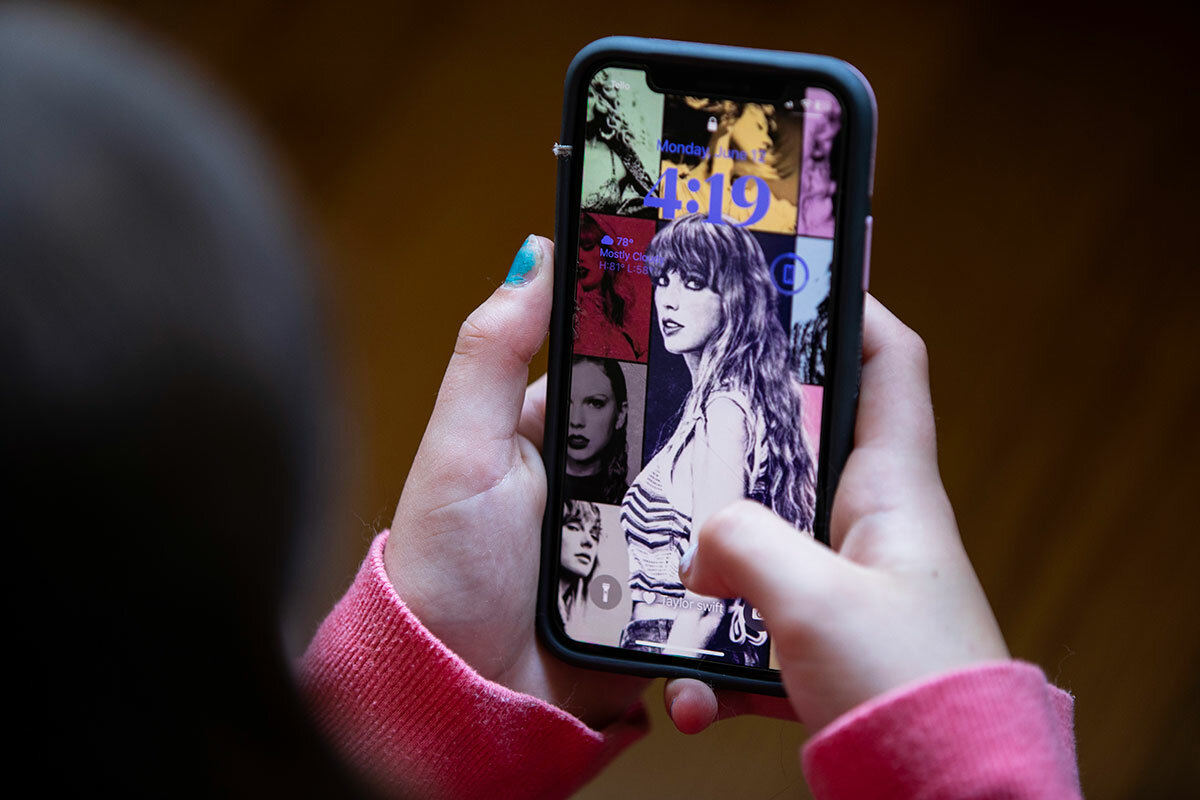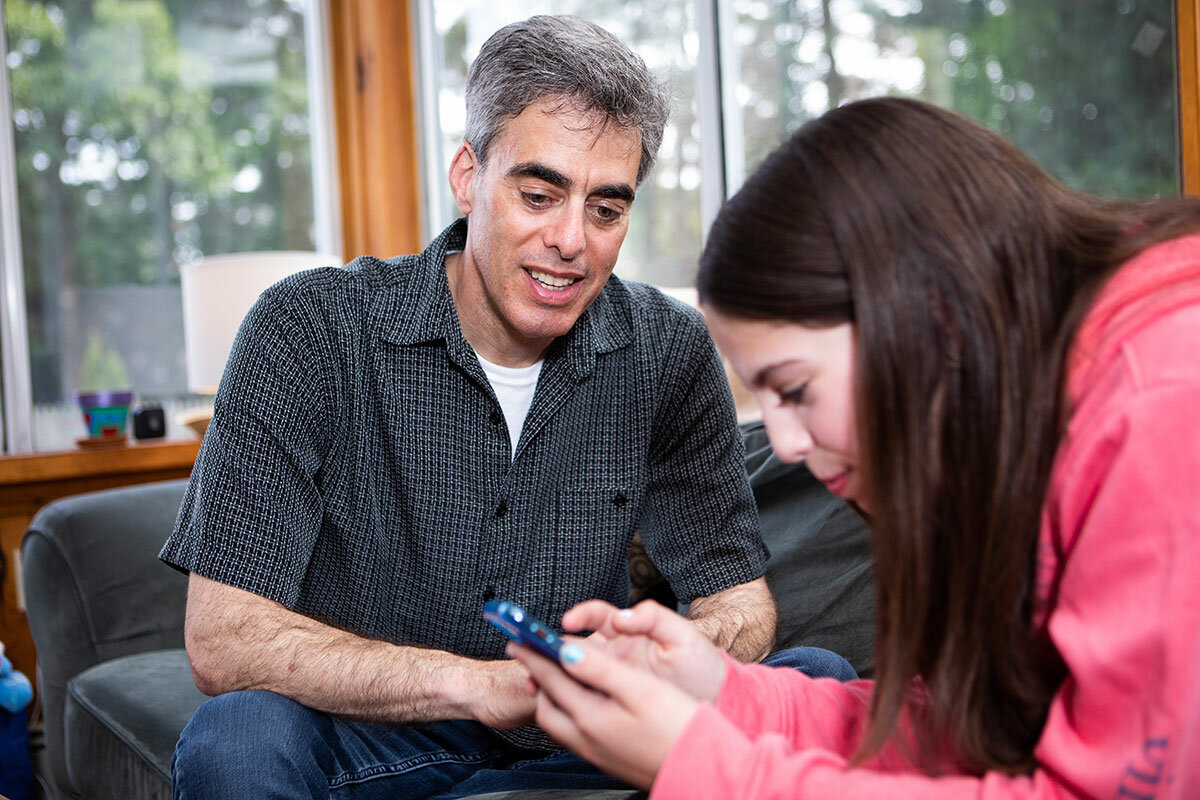Signing off social: Meet the teens with no time for TikTok
Loading...
| Washington
When Tanvi Chawla got a phone in fifth grade, she wanted access to “everything” – all social media. But her parents said no until she was 13. Now in 10th grade at an all-girls school in Pasadena, California, Tanvi’s views on social media have almost entirely reversed.
In early 2020, when Tanvi – along with the rest of the world – found herself stuck at home, social media became her “entire life,” she says. “I didn’t post much but it was a means of communication with my friends because ... I couldn’t see them physically.”
But after a few months of life online, Tanvi deleted Instagram in the beginning of eighth grade. She hasn’t replaced it with any other social media. “I just saw how harmful it was to my mental health and I think it was negatively impacting my peers, too,” she says. “So I made that decision for myself to stop using it.”
Why We Wrote This
The era of smartphones and living online reached a crescendo during the pandemic. Now, some teenagers and their parents are contemplating a life lived purely in the real world.
The pandemic forced most students almost entirely online for their school and social lives, renewing the focus on the effects of social media on children and young adults. Many students enter high school with their phones seemingly glued to the palms of their hands. And rates of anxiety and depression, particularly among girls, have skyrocketed since 2010.
“[Technology] is just so present that it’s impossible to completely disconnect and function for many people,” says Liz Kolb, a clinical professor of education technologies and teacher education at the University of Michigan. “If it’s true for adults, it’s also true for the students.”
As a teacher, Ms. Kolb understands the inclination to go straight to cellphone bans. But whether a school bans phones or not, it’s worth taking the time to teach students good habits, she says. “I think best practice is not about trying to ignore the thing that our students have to use to function every day, but rather teaching them how to use it in a way that is going to be positive and healthy.”
In May, the U.S. surgeon general issued a public warning about the risks posed by social media to youth mental health. On June 14, Texas Gov. Greg Abbott signed a law that would ban anyone under 18 from a broad variety of social media without explicit parental consent. The Louisiana House passed a similar bill earlier this month, and other states, including Connecticut, Minnesota, and Ohio, are considering parental consent laws. A found that most Americans, regardless of age, would like to return to a time when society was unplugged. The desire was highest among Americans ages 35-54 (77%), but 63% of 18- to 34-year-olds said they’d prefer to live in a simpler era, too.
The town that banned cellphones
In Ireland, parents and schools in the town of Greystones implemented a townwide voluntary cellphone ban for children.
Rachel Harper, principal of St. Patrick’s primary school in Greystones, has noticed increasing anxiety among her 8-, 9-, and 10-year-old students. Parents report the same, adding that it’s hard to get their kids to sleep at night. Students are concerned about their bodies and self-image in a way Ms. Harper hasn’t noticed in that age group before.
“Their childhood is getting shorter and shorter,” she says.
Both parents and teachers are concerned for students’ online safety. “They’re just not emotionally ready to maneuver everything on a smart device,” she explains.
So she reached out to the principals of the other seven schools in Greystones. Together with parents, they started a community-led initiative to shelter children by agreeing that, across the town, students wouldn’t have phones until after primary school.
The collective effort makes all the difference, says Ms. Harper. “From a kid’s point of view, there’s that sense of fairness, that it’s not just them” without a phone.
has attracted positive attention from all around the world, says Ms. Harper. She’s heard from many educators saying they’ve wished to implement a similar approach in their schools, though they didn’t think it was possible.
Many schools in the United States have cellphone bans to curb use. Policies vary from allowing students to have but not use phones to requiring them to place phones in locked pouches during school hours. The Buxton School, a private day and boarding school in northwestern Massachusetts, last year banned cellphones entirely during the semester. Buxton offered students an alternative: the Light Phone, which texts, calls, and offers basic functions like a calculator, but has no capacity for email or accessing the internet.
After one full school year, the experiment appears “largely successful,” says assistant head of school John Kalapos, who also teaches English and wood shop.
Living through screens during the pandemic was a fine temporary substitution, says Mr. Kalapos. Now that in-person interaction is back, technology should be used as a tool; what he terms “smartphone creepage” should be minimized.
Students do say they want to be on their phones less, he says, though not all of them love Buxton’s no-smartphone policy. The policy was first considered in early 2021 and was rejected. But gradually, Mr. Kalapos says, faculty started seeing that “community wasn’t strengthened because we had [smartphones] there.”
When students’ whole lives suddenly shifted online in 2020, Mr. Kalapos became much more aware of cyberbullying. It tends to be based on exclusion, which is challenging for teachers to mediate when it takes place in the form of “likes” – or the lack thereof – online.
It’s countercultural to not have a smartphone, says Joe Hollier, co-founder of Light. And while something like the Light Phone is a useful product, actually cutting back on technology exposure “takes user will.”
Fear of missing out is what prevents most people – himself included – from moving away from smartphones, says Mr. Kalapos of the Buxton school. But once you do it, “you realize it’s not as valuable as you think.”
“I used to be a little Luddite”
Ilena Moses, an 11th grader at the same Pasadena school as Tanvi, has always been skeptical of tech and social media. “I used to be a little Luddite,” she says.
Now, she sees being online as “a necessary evil,” so she has Instagram – logging on a couple times a week for five to 10 minutes.
Last year she was struck by the fact that “hanging out” with friends meant sitting in a room together scrolling on their phones.
That didn’t sit well with her. “There should be something better. We could be talking; we could be reading; we could be playing mini golf,” she says. “There’s a whole world out there.”
Ilena, who’s the editor of the school paper and is starting to look at colleges, loves studying writing and history – especially early American history and the Progressive Era.
Proceeding, cautiously
Twelve-year-old Cara Saks, from Massachusetts, was the last of her friends to get an iPhone. She is also, as far as she knows, the only one to draw up a contract to gain her parents’ permission. Her parents made their own edits to the contract. Some of the rules: Her phone must charge in her parents’ room at night, and her social media accounts are private. And though their concerns about the pervasiveness of technology persisted, they gave Cara her first iPhone for Hanukkah.
On top of general concerns about the content their daughter could be presented with, Andy and Deb Saks struggle to keep up with the pace at which social media and technology are evolving. “I’ve told [Cara] many times, your generation is part of an experiment that we’ve never tried before, to see how children cope as they grow with this exposure to this giant online world,” says Mr. Saks.
“And I wonder a lot about how we’re shaping this generation’s perceptions of themselves,” he says. “I worry a lot about how it feeds into her self-esteem.”
Still, there’s an inevitability to it, Mr. Saks says. Setting boundaries and talking through situations as they come up seems, to him and his wife, to be the safest way to expose their daughter to social media.
Cara, for her part, feels like her parents are more worried than others. To her, it’s simple. She does notice addiction creeping up at times, so she’ll “just stop,” says Cara.
And there are things she loves, like the ability to stream Taylor Swift. Music, she says, “is not one of the bad addictions.”
While researchers, teachers, and government officials are examining data, students like Ilena, Tanvi, and Cara are focused on self-awareness. And while they’re aware of how the presence of social media affects them, they’re also aware of the advantages to having it, like social cohesion.
Social media is so often a topic of conversation “in real life,” says Ilena, that not keeping up with trends can feel ostracizing. She picks up some information from friends, but “it can feel a little isolating.”
For Tanvi, who no longer uses any social media, interacting with her own friends isn’t difficult. But it’s harder when she’s meeting new people, who want to chat about social media trends, to find common ground.
One thing she has noticed since abstaining from Instagram is leisure. Now she bakes and reads memoirs – most recently, “Acid for the Children,” by Flea of the Red Hot Chili Peppers. Says Tanvi, “I have so much more free time.”







